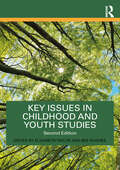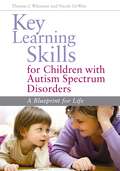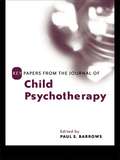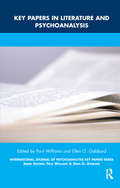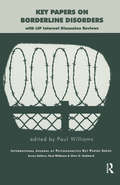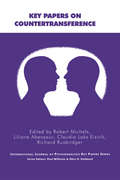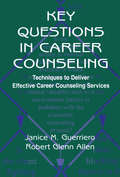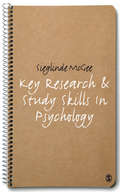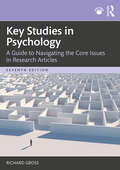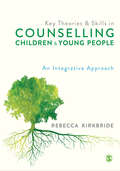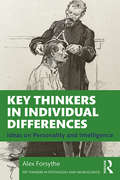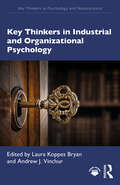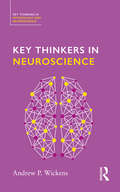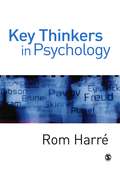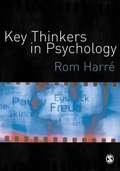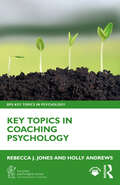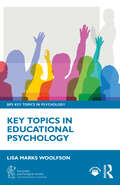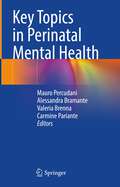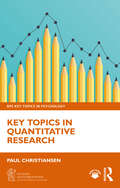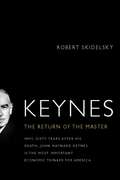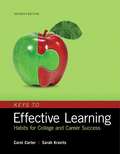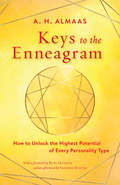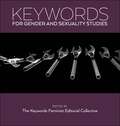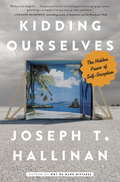- Table View
- List View
Key Issues in Childhood and Youth Studies
by Elizabeth TaylorThis fully revised and expanded second edition of Key Issues in Childhood and Youth Studies presents an informed and critical commentary on a range of key issues related to children and childhood, from birth to eighteen years.Challenging current orthodoxies within the adult world on the nature of childhood, it is an essential text for students of childhood and youth studies as well as those studying relevant professional qualifications in social work, teaching and health. Exploring ideas from the historical development of childhood to the demonising of youth, it is divided into five clearly defined sections, each with their own editorial introduction which highlights the key themes: Creating Childhood, The Developing Child, Children at Risk, The Politics of Childhood, Bordered Childhood and International Perspectives.Containing 15 newly written chapters and three revised pieces, this invaluable textbook provides an overview of childhood and youth studies and encourages students to think about the issues discussed and to develop their own ideas. Each chapter contains student activities, key concept boxes, recommended further reading and a reflection exercise.
Key Learning Skills for Children with Autism Spectrum Disorders
by Thomas L. Whitman Nicole Dewittxx
Key Papers from the Journal of Child Psychotherapy
by Paul S. BarrowsThe practice of child psychotherapy builds upon the writings and contributions of earlier writers, such that it is not only the latest research and theory that are valuable. Key Papers from the Journal of Child Psychotherapy provides access to classic and important papers from the early years of the Journal - papers that have previously been difficult to obtain. The papers are grouped thematically to cover the entire range of work represented in the journal: theoretical, clinical, applied. The papers, written by professionals at the forefront of their fields, cover areas including psychoanalytical metapsychology, work with deprived children, work with trauma, and how psychoanalytic thinking can be applied in the context of institutions for children. Chapters include:: : Anne Alvarez's Problems in the Use of the Countertransference : : Edna O'Shaughnessy's The Absent Object : : Gianna Henry's Doubly DeprivedKey Papers from the Journal of Child Psychotherapy presents in one accessible volume, essential papers for all those training and practising in child psychotherapy. It will be of great benefit to all professionals involved in direct work with children.
Key Papers in Literature and Psychoanalysis (The IJPA Key Papers Series)
by Paul Williams Glen O. GabbardThis book presents several essays from the International Journal of Psychoanalysis that explore overlaps of literary experience and psychoanalytic process, providing the reader with a substantive contribution that reflects the principal concerns of contemporary psychoanalysis.
Key Papers on Borderline Disorders: With IJP Internet Discussion Reviews (The IJPA Key Papers Series)
by Paul WilliamsThe International Journal of Psychoanalysis Key Papers Series brings together the most important psychoanalytic papers in the journal's eighty-year history in a series of accessible monographs. Approaching the IJP's intellectual resources from a variety of perspectives, the monographs highlight important domains of psychoanalytic enquiry.
Key Papers on Countertransference: IJP Education Section (The IJPA Key Papers Series)
by Paul Williams Glen O. Gabbard Liliane Abensour Richard Rusbridger Robert Michels Claudio Laks EizirikThe International Journal of Psychoanalysis Key Papers Series brings together the most important psychoanalytic papers in the journal's eighty-year history in a series of accessible monographs. Approaching the IJP's intellectual rsources from a variety of perspectives, the monographs highlight important domains of psychoanalytic enquirry. 'The papers in this volume were commissioned with a view to describing the current views of countertransference, and thier historical evolution, in four intellectual communities of psychoanalysis: North America, Britain, France and Latin America. 'Psychoanalysis is still sometimes described as a monolithic and unchanging theory and practice. These papers vividly contradict such a view through their close study of the evolution of the concept of countertransference from the periphery of psychoanalysis to its current position of central importance in most analytic communities. In doing so, they provide a window of the development of a living and evolving discipline during its first one hundred years.'- From the Introduction by Richard Rusbridger
Key Questions in Career Counseling: Techniques To Deliver Effective Career Counseling Services
by Robert G. Allen Janice M. GuerrieroThis book's purpose is to provide a tool for career services personnel to deliver more effective, consistent career counseling. Its primary objective is to present a career counseling process model, including sequential stages and steps, along with a method (the Key Questions Technique) for successfully implementing the model. It is intended to serve as the bridge between the theoretical and the applied worlds of career counseling, and it is hoped that this book will increase the standards of professionalism and objectivity for the many diverse practitioners who currently conduct career counseling in the workplace.
Key Research and Study Skills in Psychology
by Sieglinde McGeeI am happy to recommend this to my students as it covers jargon without using jargon and explains all those simple things that many academics take for granted. It also gives good examples of how to get the best from your time studying psychology from how to write good essays to the rules of writing lab reports′ - Dr Jay Coogan University of East London ′I am happy to recommend this to my students as it covers jargon without using jargon and explains all those simple things that many academics take for granted. It also gives good examples of how to get the best from your time studying psychology from how to write good essays to the rules of writing lab reports.′ Dr Joy Coogan, University of East London This book provides students with a wide range of research and study skills necessary for achieving a successful classification on a psychology degree course. It replaces the stress and fear experienced when encountering essays, reports, statistics and exams with a sense of confidence, enthusiasm and even fun. Sieglinde McGee presents indispensable instruction, advice and tips on note making and note taking, evaluating academic literature, writing critical essays, preparing for and doing essay and MCQ exams, understanding research methods and issues associated with conducting research, writing and presenting reports and research and also some important computer skills. Examples provided will show how to score well on assignments and exams and also the sort of approach, layout, errors, omissions or answer-style that would achieve a lower grade. Practical exercises and interactive tasks are integrated throughout to clarify key points and give the students a chance to practise on their own. This is a useful resource for students taking modules in study and research skills in psychology and an essential guide for all other students studying on psychology programmes. Dr Sieglinde McGee is an Associate of the School of Psychology at Trinity College, Dublin, where she taught for several years.
Key Studies in Psychology: A Guide to Navigating the Core Issues in Research Articles
by Richard GrossNow in its seventh edition, this book brings together 30 classic and contemporary studies in psychology to show students how to analyse key studies in the field, understand how classic theories are constantly revisited by modern researchers, and develop the skills required to write about psychology in exams and essays.Pulled from each of the five major areas of psychology – cognitive, developmental, individual differences, social, and biopsychology – the studies cover such topics as language and memory, attachment, mental disorder, bystander intervention, and near-death experiences. Each chapter looks at the background and context to a classic and contemporary study and provides a summary of them, before going on to evaluate areas of agreement and convergence, disagreement and divergence, and strengths and weaknesses. Each of these areas focuses on theoretical, methodological/statistical, and ethical issues. Finally, suggestions are made regarding applications, implications, and future research directions. In so doing, the book helps students learn how to deal with primary sources, including how to extract the most relevant information, assess strengths and weaknesses, know what to look for when evaluating a study, and understand how it relates to other research.Bridging the gap from A-level to degree level study, this is the ideal resource for undergraduate students in psychology.
Key Theories and Skills in Counselling Children and Young People: An Integrative Approach
by Rebecca KirkbrideThis book provides a highly accessible, skills focused entry point to the interventions, techniques, strategies, and core knowledge you need to work with children and young people. Divided into four parts, it covers: - Core Knowledge: Understanding Development from 0-18 years - Key Skills: The Therapeutic Process - Key Skills: Interventions, Techniques & Strategies - Key Considerations: Contexts & Client Groups Its bite sized entries include suggested additional resources to help you explore the topic further, and throughout the book you will find case studies and exercises to aid your understanding. This book is ideal for mental health and therapy trainees and practitioners who need a foundation in working with children and young people.
Key Theories and Skills in Counselling Children and Young People: An Integrative Approach
by Rebecca KirkbrideThis book provides a highly accessible, skills focused entry point to the interventions, techniques, strategies, and core knowledge you need to work with children and young people. Divided into four parts, it covers: - Core Knowledge: Understanding Development from 0-18 years - Key Skills: The Therapeutic Process - Key Skills: Interventions, Techniques & Strategies - Key Considerations: Contexts & Client Groups Its bite sized entries include suggested additional resources to help you explore the topic further, and throughout the book you will find case studies and exercises to aid your understanding. This book is ideal for mental health and therapy trainees and practitioners who need a foundation in working with children and young people.
Key Thinkers in Individual Differences: Ideas on Personality and Intelligence (Key Thinkers in Psychology and Neuroscience)
by Alex ForsytheKey Thinkers in Individual Differences introduces the life, work and thought of 25 of the most influential figures who have shaped and developed the measurement of intelligence and personality. Expanding on from a résumé of academic events, this book makes sense of these psychologists by bringing together not only their ideas but the social experiences, loves and losses that moulded them. By adapting a chronological approach, Forsythe presents the history and context behind these thinkers, ranging from the buffoonery and sheer genius of Charles Galton, the theatre of Hans Eysenck and John Phillipe Rushton, to the much-maligned and overlooked work of women such as Isabel Myers, Katherine Briggs and Karen Horney. Exploring all through a phenomenological lens, the background, interconnections, controversies and conversations of these thinkers are uncovered. This informative guide is essential reading to anyone who studies, works in or is simply captivated by the field of individual differences, personality and intelligence. An invaluable resource for all students of individual differences and the history of psychology.
Key Thinkers in Industrial and Organizational Psychology (Key Thinkers in Psychology and Neuroscience)
by Andrew J. Vinchur Laura Koppes BryanKey Thinkers in Industrial and Organizational Psychology explores the lives, ideas, contributions, and impact of key figures who have shaped and developed industrial and organizational (I-O) psychology.Through a chronological lens, the book traces the history and context behind the groundbreaking work of a diverse group of individuals who have influenced the field. Among those featured are pioneers such as Walter Dill Scott, Charles S. Myers, Lillian Evelyn Moller Gilbreth, Francizka Baumgarten-Tramer, Chen Li, and Bernard M. Bass. The book offers the reader a comprehensive understanding of the evolving ideas and discoveries that have shaped I-O research and practice over time.This book is an invaluable resource for all scientists and practitioners of I-O psychology and historians of psychology, as well as anyone interested in how psychology has transformed workplaces and influenced organizational practices.
Key Thinkers in Neuroscience
by Andy WickensKey Thinkers in Neuroscience provides insight into the life and work of some of the most significant minds that have shaped the field. Studies of the human brain have been varied and complex, and the field is rich in pioneers whose endeavours have broken new ground in neuroscience. Adopting a chronological and multi-disciplinary approach to each Key Thinker, the book highlights their extraordinary contributions to neuroscience. Beginning with Santiago Ramon y Cajal and finishing with the philosophers Patricia Churchland and Paul Churchland, this book provides a comprehensive look at the new ideas and discoveries that have shaped neuroscientific research and practice, and the people that have been invaluable to this field. This book will be an indispensable companion for all students of neuroscience and the history of psychology, as well as anyone interested in how we have built our knowledge of the brain.
Key Thinkers in Psychology
by Rom Harre`For anyone that has spent years rowing off into convoluted estuaries, and would like an entertaining and useful chart to remind them of River Psychology as a whole, I thoroughly recommend this book′ - The Psychologist `This is a highly enjoyable, erudite and beautifully written manuscript. It conveys a rare depth of understanding and ability to strike at the core debates. The lively style, concentration on the biopic, use of text features such as links between names, and formal division of each sub-section will all appeal.… I have taught History of Psychology for nearly 6 years. This text will prove for more palatable to students than any of the competitors′ - Dr Steve Brown, Loughborough University `This book is well-written. It is clever, flowing and engaging. The balance between biography and contribution is excellent and makes it almost un-put-downable′ - Professor Adrian Furnham, University College London The 20th Century was rich in attempts to characterize and explain psychological phenomena and so to understand the human mind. These projects were undertaken by a huge and diverse list of characters from B F Skinner to James Gibson, from Gordon Allport to Hans Eysenck. It is important for every student of psychology, wherever they might be in the world, to understand the classic scholars, the classic studies, and the subsequent generations of people and ideas that have come to define the broad discipline that is `psychology′. This book achieves this in the most accessible and engaging manner possible. Rom Harré presents a unique textbook orientation, combining the biopic with the significance of the major protagonists of the last century, organized by `schools of thought′, yet with cross-references throughout the text.
Key Thinkers in Psychology
by Rom HarréIt is important for every student of psychology, wherever they might be in the world, to understand the classic scholars, the classic studies, and the subsequent generations of people and ideas that have come to define the broad discipline that is 'psychology'. This book achieves this in the most accessible and engaging manner possible. Rom Harré presents a unique textbook orientation, combining the biopic with the significance of the major protagonists of the last century, organized by 'schools of thought', yet with cross-references throughout the text.
Key Topics in Coaching Psychology (BPS Key Topics in Psychology)
by Holly Andrews Rebecca J. JonesOffering a concise and easy-to-read introduction to the subject, this book deals with key topics in the study of coaching psychology. It explains what coaching psychology is, when and why it is used, and what research can tell us about how and why it works.The book opens with an exploration of the key foundations of coaching psychology, including how it is defined, where it began, and how has it developed. This is followed by an overview of the key theories informing coaching psychology: person-centred theories, goal-setting theory, adult learning theory, and the main theoretical approaches to coaching (behavioural coaching, cognitive behavioural coaching, psychodynamic coaching, and systemic coaching). The authors discuss the key methodologies used in coaching psychology research, covering both quantitative and qualitative approaches, before exploring the impact of coaching psychology on five areas of practice: coaching in the workplace, career coaching, coaching in education, life coaching, and health coaching. Finally, they suggest future directions for the field by examining emerging areas in research and practice.Academically informed, and fully integrating key theories with application in coaching practice, this book gives readers a comprehensive yet accessible understanding of coaching psychology. Key Topics in Coaching Psychology is the ideal resource for undergraduate and postgraduate students of coaching psychology and occupational psychology, business, and leadership, as well as anyone with an interest in learning more about coaching psychology.
Key Topics in Educational Psychology (BPS Key Topics in Psychology)
by Lisa Marks WoolfsonWritten by an experienced academic and practitioner, this book offers a clear and accessible introduction to educational psychology.The book begins by exploring the history of educational psychology, highlighting key figures in its development and the complex and changing relationship between education and psychology. It examines important theories in the field and provides a discussion of the different methodologies researchers use. Importantly, the book goes on to highlight key impacts of the research on current practice and policy, as well as suggesting emerging areas and future directions for the field. In so doing, it offers a self-contained and easily digestible primer for those studying educational psychology and related disciplines.Key Topics in Educational Psychology is a must-read for undergraduate and postgraduate students of educational psychology, psychology of education, education, and educational studies. It will also be of interest to practitioners in training, particularly those who work in educational settings, including educational psychologists, teachers, therapists, and social workers.
Key Topics in Perinatal Mental Health
by Mauro Percudani Alessandra Bramante Valeria Brenna Carmine ParianteThe book offers a comprehensive and up-to-date overview of key issues in perinatal mental health. Classic topics such as screening, assessment, pharmacological, psychological and psychosocial interventions of the most common conditions (depression, anxiety disorders, etc.) are combined with lesser known issues, such as mother-infant relationship disorders or thoughts of infant-related harm and aggressive behaviors, sleep disturbances in puerperium, obsessional disorders, fetal death etc., paying particular attention to specific groups of perinatal patients like mothers with cancer, adolescents, fathers, migrants, and preterm babies. The chapters written by health professionals working in hospitals, community services or voluntary agencies alternate with contributions from researchers whose fields of expertise include biology and neuroscience, diagnosis and special needs, treatment and prognosis, etc., striking a balance between scientific investigation and clinical practice.The book offers a valuable tool for a wide range of professionals like psychiatrists, psychologists, gynecologists, midwives, oncologists, pediatricians, and social workers, who want to improve their clinical practice and the effectiveness of their treatment pathways using evidence from perinatal health research.
Key Topics in Quantitative Research (BPS Key Topics in Psychology)
by Paul ChristiansenThis book gives an overview of the key topics in quantitative methods. Written by an academic who has specialised in quantitative methods in Psychology across a range of sub disciplines, it highlights how crucial understanding quantitative methods is to understanding research in psychology and beyond.First, it briefly considers the history of quantitative methods in psychology citing some key figures in both psychology and statistics. Following this it will describe how we apply models of scientific investigation to psychology to generate reliable knowledge. It will then go on to consider key models we use in quantitative research, from experimental designs to quasi-experimental and correlational designs. Next it introduces sampling theory, and its role in understanding who our findings apply to. The final theoretical consideration is a concise description of null hypothesis significance testing and how we can use it to make inferences about psychological phenomena. In the next part of the book there will be a focus on some core methods. Starting with a discussion of we sample participants before exploring statistics in detail. Next, the book looks at how robust quantitative research can impact other fields and policy through improving ecological validity and reliability. Finally, the book gets to grips with key challenges in the future of quantitative research with a discussion of the replication crisis and solutions to it and then exploring how we can improve inclusivity. This book is an essential text for all students of quantitative methodology.
Keynes
by Robert SkidelskyThe ideas of John Maynard Keynes have never been more timely. No one has bettered Keynes's description of the psychology of investors during a financial crisis: OCyThe practice of calmness and immobility, of certainty and security, suddenly breaks down. New fears and hopes will, without warning, take charge of human conductOC the market will be subject to waves of optimistic and pessimistic sentiment. ' Keynes's preeminent biographer, Robert Skidelsky, Emeritus Professor of Political Economy at the University of Warwick, brilliantly synthesizes from Keynes's career and life the aspects of his thinking that apply most directly to the world we currently live in. In so doing, Skidelsky shows that Keynes's mixture of pragmatism and realism OCo which distinguished his thinking from the neo-classical or Chicago school of economics that has been the dominant influence since the Thatcher-Reagan era and which made possible the raw market capitalism that created the current global financial crisis OCo is more pertinent and applicable than ever. Crucially Keynes offers nervous capitalists OCo and Keynes never wavered in his belief in the capitalist system OCo a positive answer to the question we now face: When unbridled capitalism falters, is there an alternative? In the long run, as Keynes famously said, we are all dead. We may not have time to wait for the perfect theoretical operation of capital as the neo-classicists insist will happen eventually. In the meantime, we have Keynes: more supple, more human and more magnificently real than ever.
Keys to Effective Learning: Habits for College and Career Success
by Carol Carter; Sarah Lyman KravitsKeys to Effective Learning nurtures these skills in students entering college by focusing on building accountability, teamwork, and critical/creative thinking skills that can be applied to any academic or workplace setting.
Keys to the Enneagram: How to Unlock the Highest Potential of Every Personality Type
by A. H. AlmaasMore than just a tool to diagnose your personality type, the Enneagram was originally developed to help people find the ultimate freedom of consciousness and achieve spiritual liberation. A. H. Almaas brings us back to this original mission as he shares the essential keys that will help readers break free from the limitations and distortions of each type&’s fixation—and to express their true spiritual nature in everyday life.
Keywords for Gender and Sexuality Studies (Keywords #13)
by Mishuana Goeman Aimee Bahng Kyla Wazana Tompkins Amber Jamilla Musser Aren Z. Aizura Karma R. ChávezIntroduces key terms, debates, and histories for feminist studies in gender and sexualityKeywords for Gender and Sexuality Studies introduces readers to a set of terms that will aid them in understanding the central methodological and political stakes currently energizing feminist and queer studies. The volume deepens the analyses of this field by highlighting justice-oriented intersectional movements and foregrounding Black, Indigenous, and women of color feminisms; transnational feminisms; queer of color critique; trans, disability, and fat studies; feminist science studies; and critiques of the state, law, and prisons that emerge from queer and women of color justice movements. Many of the keywords featured in this publication call attention to the fundamental assumptions of humanism’s political and intellectual debates—from the racialized contours of property and ownership to eugenicist discourses of improvement and development. Interventions to these frameworks arise out of queer, feminist and anti-racist engagements with matter and ecology as well as efforts to imagine forms of relationality beyond settler colonial and imperialist epistemologiesReflecting the interdisciplinary breadth of the field, this collection of seventy essays by scholars across the social sciences and the humanities weaves together methodologies from science and technology studies, affect theory, and queer historiographies, as well as Black Studies, Latinx Studies, Asian American, and Indigenous Studies. Taken together, these essays move alongside the distinct histories and myriad solidarities of the fields to construct the much awaited Keywords for Gender and Sexuality Studies.
Kidding Ourselves
by Joseph T. HallinanFrom the Pulitzer Prize-winning journalist and author of Why We Make Mistakes, an illuminating exploration of human beings' astonishing ability to deceive themselves. To one degree or another, we all misjudge reality. Our perception--of ourselves and the world around us--is much more malleable than we realize. This self-deception influences every major aspect of our personal and social life, including relationships, sex, politics, careers, and health. In Kidding Ourselves, Joseph Hallinan offers a nuts-and-bolts look at how this penchant shapes our everyday lives, from the medicines we take to the decisions we make. It shows, for instance, just how much the power of many modern medicines, particularly anti-depressants and painkillers, is largely in our heads. Placebos in modern-day life extend beyond hospitals, to fake thermostats and "elevator close" buttons that don't really work...but give the perception that they do. Kidding Ourselves brings together a variety of subjects, linking seemingly unrelated ideas in fascinating and unexpected ways. And ultimately, it shows that deceiving ourselves is not always negative or foolish. As increasing numbers of researchers are discovering, it can be incredibly useful, providing us with the resilience we need to persevere, in the boardroom, bedroom, and beyond. Provocative, accessible, and easily applicable to multiple facets of everyday life, Kidding Ourselves is an extraordinary new exploration of our mind's flexibility.
